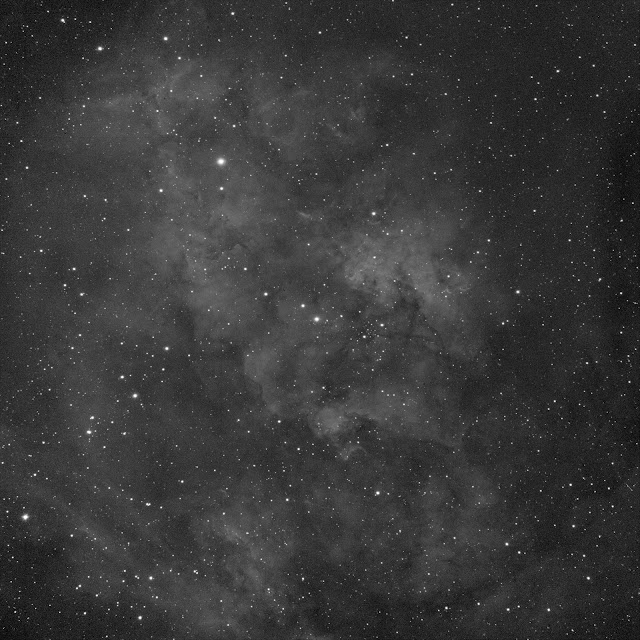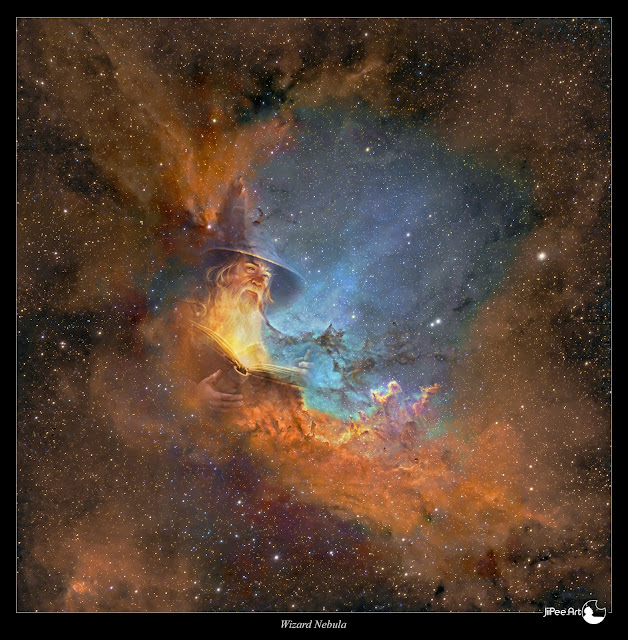COPYRIGHT, PLEASE NOTE
Saturday, December 21, 2024
Sharpless 132, A Furious Cosmic Horse Gets Blinded by a Divine Blue Light
This is one of my favorite targets in Cepheus, Sh2-132 has an interesting structures due to massive energetic stars in it. I haven't found any explanation to the blue, jet like, structure glowing blue light of ionized Oxygen (O-III), the structure is visible also in H-alpha light.
When I shot firs photos out of this distant object about twenty years ago, I gave a longish name to it, "A Furious Cosmic Horse Gets Blinded by a Divine Blue Light" I don't usually name my photos but with some of them I simply must do so.
This is a kind of high resolution photo taken with my new imaging platform, it covers about 0.7 x0.7 degrees of sky. (Full Moon has an apparent diameter 0,5 degrees) Seeing was very good to my location, FWHM about 1.6 arcseconds, that's rare up here.
Sharpless 132
A Furious Cosmic Horse Gets Blinded by a Divine Blue Light
 A mapped color image from a light emitted by an ionized elements,
A mapped color image from a light emitted by an ionized elements, sulfur=red, hydrogen=green and oxygen=blue


sulfur=red, hydrogen=red and oxygen=blue, this combination is very close to a natural color palette.
A single calibrated 20 min exposure of H-alpha, Bin 1x1
Thursday, December 19, 2024
Pansy of the Swan, Sharpless 112
My previous image was showing the Sharpless 115 an emission nebula area in Cygnus, just next to it lays another Sharpless catalog target, Sh2-112.
My new photo about Sh2-112 has O-III and S-II data from my older image of Sharpless 112 from the October 2015. The new H-alpha data is much deeper and has a higher resolution. For some reason, this target has always been very difficult to process. Details in a background are very diffused and the actual emission nebula has a vast dynamic range, from a very bright to a very dim features.
I renamed this target to a "Pansy of the Swan" since the bright nebula looks like a blooming yellow pansy.

sulfur=red, hydrogen=green and oxygen=blue

sulfur=red, hydrogen=red and oxygen=blue, this combination is very close to a natural color palette.

This is my very large mosaic photo of the whole Cygnus, more info about this massive photo
Sunday, December 15, 2024
New Photo, Sharpless 115 in Cygnus
This Portion of sky covers less than a square degrees of sky in Constellation Cygnus, the Swan.
This star nursery has always looked to me like like it was cut out of the Baroque painting.
I was able to shoot a high resolution data for it with my new imaging setup. The Celestron Edge 14". This telescope has a beautiful optics and with a secondary mirror focuser, it'll hold the collimation perfectly all the time. Normally the heavy main mirror is used for focusing and it can be source of optical problems when it moves due to gravity when the scope is moving and pointing to a different portions of sky.
BAROQUE SKY OF SHARPLESS 115
Click for a full size photo, 2000x2000 pixels
sulfur=red, hydrogen=green and oxygen=blue
Shining with the light of ionized atoms of hydrogen, sulfur, and oxygen in this Hubble palette color composite image, the nebular glow is powered by hot stars in star cluster Berkeley 90. The cluster stars are likely only 100 million years old or so and are still embedded in Sharpless 115. But the stars' strong winds and radiation have cleared away much of their dusty, natal cloud. At the emission nebula's estimated distance, this cosmic close-up spans just under 100 light-years.
Source: NASA APOD
sulfur=red, hydrogen=red and oxygen=blue, this combination is very close to a natural color palette.
This is my very large mosaic photo of the whole Cygnus, more info about this massive photo
Monday, December 9, 2024
Wizard Nebula, NGC 7380
My new setup has a long focal length optics, Celestron EDGE 14", after years of shooting the wider field astronomical photos, it's very nice to dig in to the details of those cosmic wonders.
My new photo shows the Wizard nebula in Cepheus, I have shot this target many times with a various optical configurations. The combination of 14" telescope and large 12 micron pixels of my "new" second hand camera, Apogee Alta U9000M, delivers an optimal resolution to my seeing conditions (0.91 arcsecond/pixel). This makes possible to go very deep in relatively short cumulative exposure time, as can be seen in this photo. A dim background nebulosity stand out nicely after about six hours of H-alpha exposures.
Click for a full size photo, 2000x2000 pixels
sulfur=red, hydrogen=green and oxygen=blue
Click for a full size photo, 2000x2000 pixels
Click for a full size image.























